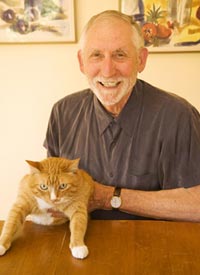There was a long article in the New Yorker in late August on what is being called laughter yoga, a type of yoga that is wonderfully simple. A teacher begins the class by pretending to laugh, and encourages the students to join with their own pretended laughter. Even though the initial laughs are artificial, soon the teacher and most of the students are actually laughing, not pretending. After the class, the students report that it was highly enjoyable, and vow to continue.

Apparently there are now thousands of classes in India, where it originated, and in Asia and Europe as well. I happen to know that there are many classes in Denmark, for example. Closer to home, classes have been going on for some time in San Luis Obispo, and will probably start in Santa Barbara and Ojai soon.
Yet in this country, there seems to be less interest than in the rest of the world. Perhaps laughter yoga is seen as shallow, a mere fad. The Indian originator offers no explanation of why it works, nor does the New Yorker. If we understood the process, however, it might turn out to be surprisingly deep.
To begin with a simplified explanation: Suppose that for various reasons, most people have a backlog of unlaughed laughs, and that any genuine laugh, no matter the cause, would chip away at the backlog. Bodily preparation for laughing involves muscular tension, at the very least. An unlaughed laugh would be one more source of tension in modern societies. Even though most of the tension from each non-laugh may gradually subside, slim layers of tension might build up gradually after thousands of nonlaughs.
No one has discovered the actual cause and consequences of laughter, though there are many theories. My own is that the cause of laughter is embarrassment, and that genuine laughter resolves of the tension involved in embarrassment, not only the mental part but also bodily tension. (Laughing at others is a different question, however, because it probably involves anger rather than embarrassment.)
Perhaps laughter yoga could be a first step toward individual and social change. In modern societies, embarrassment or at least the anticipation of embarrassment is widespread. Even when we are alone, we may be embarrassed when we think about how others might see us. Some people worry this issue to death, so to speak. In the company of others, there are all kinds of possible sources of embarrassment. For example, we become embarrassed if we see or just imagine that others are looking down on us, even if the signs are quite subtle.
If genuine laughter begins to relieve some of the tension accruing from unresolved embarrassments, it would be valuable without any other benefits. Yet there also may be another benefit. The reason we swallow so many of our emotions, such as grief, anger, fear, and embarrassment itself, is that most of us have been trained to be embarrassed by almost any emotional expression. Male children risk rejection by the other boys if they cry or are afraid, or even just embarrassed. Girls run more risk than boys with anger. Most of our emotions, most of the time, are hidden because we anticipate being embarrassed—not to say humiliated—if we express them.
So if laughter yoga reduces the backlog of embarrassment, it is also a step toward reducing the backlogs of grief, fear, and anger. In this way, laughter classes may help revive all of the feelings that usually lead only an underground existence.
Please understand that I have nothing against such time-honored methods of evoking laughter as stand-up comedy and jokes of any kind, but I think most people are filled to overflowing with unlaughed laughs, and anything that tickles them is a good thing. Besides, experienced actors know that comedy is by far the most difficult form of theater. Laughter yoga seems to offer us a format that seldom fails.
Our society is greatly advanced in the knowledge of the material world and in the realms of thought. It is very retrograde about feelings and the closely related realm of personal and social relationships. We need to understand these realms also, lest we perish. It is not too late for us and our children:
You who are on the road
Must have a code that you can live by
And so become yourself
Because the past is just a good bye.
Teach your children well… (From the popular song Teach Your Children, 1968).
The next installment will explore possible implications of these ideas for schools, churches, and other institutions.



